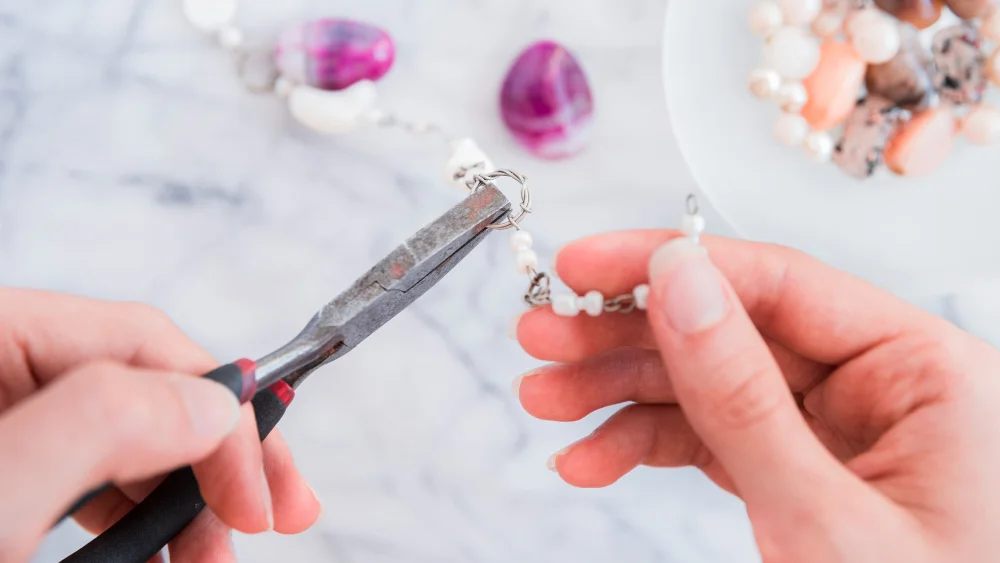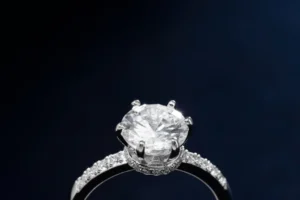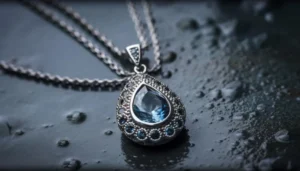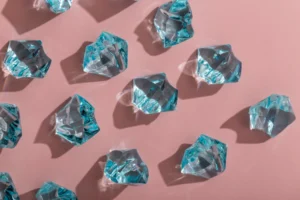“Would you rub your diamond ring with something abrasive enough to polish your teeth?” That’s the question that hit me the morning I almost did exactly that.
I was getting ready for a dinner party and noticed my gold necklace had dulled. In a rush, I Googled “how to clean jewellery quickly” and found hundreds of blogs suggesting toothpaste. It seemed too simple. But something about putting minty paste on precious metals didn’t sit right with me.
So, I paused—and went down a rabbit hole. Here’s what I found, along with expert insights and what actually happened when I tested this myself.
Why People Think Toothpaste Is a Good Jewellery Cleaner
Toothpaste is often touted as a quick fix because:
- It’s mildly abrasive (which helps polish enamel)
- It’s easily available
- It leaves a nice shine—or so it seems at first glance
Many DIY blogs recommend it for gold, silver, and even gemstones. But does it work—and more importantly, is it safe?
What Jewellery Experts and Science Say
According to Anna Louisa, a certified gemmologist from the UK-based Gem Academy:
“Toothpaste contains baking soda and other abrasives that can scratch soft metals like gold and silver. It may also damage the polish of gemstones over time.”
In fact, the Gemological Institute of America (GIA) explicitly advises against using toothpaste for cleaning fine jewellery. Their website states:
“Abrasives in household cleaners and toothpaste can cause tiny scratches that build up over time and dull the finish of your gemstones and metals.”
And there’s real science behind this. Most commercial toothpastes rate around 3–4 on the Mohs scale of hardness. Softer metals like gold (2.5–3) and even sterling silver (2.5) can be scratched by toothpaste if rubbed in.
My First-Hand Experience Cleaning with Toothpaste
Okay, I had to test it.
I used a small dab of white toothpaste (not the gel kind) on an old silver ring I didn’t wear much. With a soft toothbrush, I scrubbed gently and rinsed it with warm water. It looked shinier at first, but under the light, I noticed faint scratches that hadn’t been there before.
After just one use.
The ring’s patina had changed. That soft, aged glow? Gone. The toothpaste had stripped it, leaving a raw, overly bright shine—and not in a good way.
Lesson learned: just because something is shiny doesn’t mean it’s clean or unharmed.
Which Types of Jewellery Are Most at Risk?
Gold
Gold is soft and easily scratched, especially 18k or higher. Toothpaste can erode its surface and dull its natural lustre.
Silver
Silver tarnishes, which is why many think toothpaste is a good cleaner. But silver is also soft and prone to scratches.
Gemstones
Porous or soft stones like pearls, turquoise, and opals are especially vulnerable. Even diamonds can lose their polish if cleaned improperly.
Plated Jewellery
Gold-plated or silver-plated pieces are usually just thin coatings over base metals. Toothpaste can strip or wear down these layers in no time.
Safer Alternatives to Clean Your Jewellery
Here’s what works without damaging your precious pieces:
1. Mild Dish Soap + Warm Water
- Mix a few drops of gentle dish soap in warm water.
- Soak for 10–15 minutes.
- Use a soft toothbrush to remove dirt.
- Rinse and dry with a soft cloth.
2. Microfibre Polishing Cloths
Perfect for silver. They’re specially designed to lift tarnish without abrasion.
3. Professional Cleaning Kits
Many brands sell jewellery-safe cleaners backed by gemmological standards. Look for ones labelled as non-abrasive and pH balanced.
4. Ultrasonic Cleaners (Use Caution)
These are great for certain types of jewellery, especially hard gemstones and solid metals. But they’re not safe for pearls, opals, or glued settings.
How Often Should You Clean Jewellery?
It depends on how often you wear it:
- Daily wear (wedding rings, earrings): once a week with soap and water
- Occasional wear: once a month
- Delicate or antique pieces: professional clean every 6–12 months
Avoid over-cleaning—some patina and natural ageing adds character and value.
FAQs
Can toothpaste ruin jewellery?
Yes, especially soft metals and porous gemstones. Even one use can cause surface scratches.
What if I already cleaned my jewellery with toothpaste?
Rinse it thoroughly with warm water and consider getting it professionally polished to restore the finish.
Is baking soda safe for cleaning jewellery?
Baking soda alone can also be abrasive. It’s safer than toothpaste but still risky for delicate pieces.
Are commercial jewellery cleaners better?
Generally, yes—if they are non-abrasive and designed for your specific type of jewellery.
Final Verdict: Toothpaste Is for Teeth, Not Treasure
I’ll admit it—it’s tempting to reach for the toothpaste. It’s right there, after all. But the risk of permanent damage just isn’t worth the momentary shine.
Stick to soap and water or invest in a proper cleaner. Your jewellery deserves better—and so do you.
Your Turn: What’s Worked for You?
Have you ever tried cleaning your jewellery at home? What worked—and what didn’t? Share your tips in the comments or send me a message. Let’s help each other keep our sparkle—safely.
Further Reading:
- Gemological Institute of America (GIA) – Jewellery Cleaning Guidelines
- National Association of Jewellers (UK) – Jewellery Care Advice
- Which? UK – Jewellery Cleaning Tips
You may also want to know that why shouldn’t you wear gemstones in shower.
If you want to learn more about gemstones the make sure to visit our homepage.




